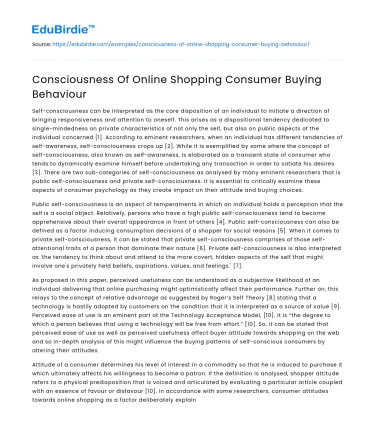Self-consciousness can be interpreted as the core disposition of an individual to initiate a direction of bringing responsiveness and attention to oneself. This arises as a dispositional tendency dedicated to single-mindedness on private characteristics of not only the self, but also on public aspects of the individual concerned [1]. According to eminent researchers, when an individual has different tendencies of self-awareness, self-consciousness crops up [2]. While it is exemplified by some where the concept of self-consciousness, also known as self-awareness, is elaborated as a transient state of consumer who tends to dynamically examine himself before undertaking any transaction in order to satiate his desires [3]. There are two sub-categories of self-consciousness as analysed by many eminent researchers that is public self-consciousness and private self-consciousness. It is essential to critically examine these aspects of consumer psychology as they create impact on their attitude and buying choices.
Public self-consciousness is an aspect of temperaments in which an individual holds a perception that the self is a social object. Relatively, persons who have a high public self-consciousness tend to become apprehensive about their overall appearance in front of others [4]. Public self-consciousness can also be defined as a factor inducing consumption decisions of a shopper for social reasons [5]. When it comes to private self-consciousness, it can be stated that private self-consciousness comprises of those self-attentional traits of a person that dominate their nature [6]. Private self-consciousness is also interpreted as 'the tendency to think about and attend to the more covert, hidden aspects of the self that might involve one's privately held beliefs, aspirations, values, and feelings.' [7].
Save your time!
We can take care of your essay
- Proper editing and formatting
- Free revision, title page, and bibliography
- Flexible prices and money-back guarantee
As proposed in this paper, perceived usefulness can be understood as a subjective likelihood of an individual delivering that online purchasing might optimistically affect their performance. Further on, this relays to the concept of relative advantage as suggested by Roger’s Self Theory [8] stating that a technology is hastily adopted by customers on the condition that it is interpreted as a source of value [9]. Perceived ease of use is an eminent part of the Technology Acceptance Model, [10]. It is “the degree to which a person believes that using a technology will be free from effort.” [10]. So, it can be stated that perceived ease of use as well as perceived usefulness affect buyer attitude towards shopping on the web and so in-depth analysis of this might influence the buying patterns of self-conscious consumers by altering their attitudes.
Attitude of a consumer determines his level of interest in a commodity so that he is induced to purchase it which ultimately affects his willingness to become a patron. If the definition is analysed, shopper attitude refers to a physical predisposition that is voiced and articulated by evaluating a particular article coupled with an essence of favour or disfavour [10]. In accordance with some researchers, consumer attitudes towards online shopping as a factor deliberately explain his psychosomatic condition in terms of buying on the internet [11]. Attitude is found to have an undeviating effect on the intention of buyers to use technology [10], [12]. Consequently, a few analysts have entitled that perceived ease of use and usefulness have a direct linkage with punter attitudes toward usability that further constructs a framework of intention to use [13].
Online market is an ever-expanding arena demanding constant but edgy transformations and thus for proper interpretation of the emergence of new marketing opportunities, researches in shopping orientation are supremely vital [16]. The proposed model enlightens these aspects unambiguously thereby aiding present and future research enthusiasts in understanding a self-conscious online buyer’s perceptions towards shopping across variegated online platforms offering an assortment of goods and services. It should be noted that this study is restricted to 400 residents of the cities of Uttar Pradesh who are online buyers making the data biased in a limited geographical boundary. However, it should not be foregone how eminent this might prove for marketers so that they can formulate their marketingstrategies accordingly.
Did you like this example?
Make sure you submit a unique essay
Our writers will provide you with an essay sample written from scratch: any topic, any deadline, any instructions.
Cite this paper
-
APA
-
MLA
-
Harvard
-
Vancouver
Consciousness Of Online Shopping Consumer Buying Behaviour.
(2021, September 27). Edubirdie. Retrieved December 22, 2024, from https://edubirdie.com/examples/consciousness-of-online-shopping-consumer-buying-behaviour/
“Consciousness Of Online Shopping Consumer Buying Behaviour.” Edubirdie, 27 Sept. 2021, edubirdie.com/examples/consciousness-of-online-shopping-consumer-buying-behaviour/
Consciousness Of Online Shopping Consumer Buying Behaviour. [online].
Available at: <https://edubirdie.com/examples/consciousness-of-online-shopping-consumer-buying-behaviour/> [Accessed 22 Dec. 2024].
Consciousness Of Online Shopping Consumer Buying Behaviour [Internet]. Edubirdie.
2021 Sept 27 [cited 2024 Dec 22].
Available from: https://edubirdie.com/examples/consciousness-of-online-shopping-consumer-buying-behaviour/
copy






 Stuck on your essay?
Stuck on your essay?

